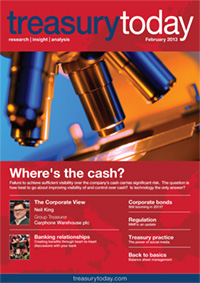Contents
- Editorial
- 2013: the year of ‘muted optimism’
- Question Answered
- Funding growth in the developing markets
- Market View
- Doomsday inflation?
- Insight & Analysis
- For better or worse
- Corporate Finance
- Corporate bonds: boom, bubble or bust?
- Treasury Practice
- Treasury for the social media age
- The Bigger Picture
- Adam Smith
- The Corporate View
- Corporate View: Neil King, Carphone Warehouse
- Regulation
- An uncertain future for money market funds
- Smarter Treasury: Deutsche Bank
- Three steps to SEPA
- Cash Management
- The visibility conundrum
- Back to Basics
- Striking a balance
Editorial
2013: the year of ‘muted optimism’
The Year of the Snake came in with more of a whimper than a hiss, with continuing concern over problems in the Eurozone and the US budget deficit. However, despite the International Monetary Fund (IMF) trimming its growth forecast for the world economy in 2013, after predicting a less vigorous recovery in the US, UK and the leading countries of the Eurozone, the general mood at the recent World Economic Forum (WEF) meeting was moderately buoyant.
The 2,500 movers and shakers gathered in Davos seemed fairly convinced that the collapse of the euro, a hard landing in China and a debt crisis in the US all look much less likely. Axel Weber, the former head of Germany’s central bank, the Bundesbank, even went as far as to say that the global recovery has passed a turning point. European Central Bank (ECB) president Mario Draghi was equally positive, expecting the Eurozone economy to begin recovering in the second half of this year.
Nevertheless, corporate treasurers still consider the uncertainty of the economic outlook as their top concern, according to a number of industry surveys.
New regulations are also top of mind for corporates – in particular the impending money market fund (MMF) reforms, which are expected to accelerate significantly in 2013. Both the US Financial Stability Oversight Council (FSOC) and International Organisation of Securities Commissioners (IOSCO) are mulling over proposals for further regulation to reduce systemic risk. This month, we take a closer look at the state of play of those proposals and the market in general.
However, in the midst of increasing global regulation, China is bucking the trend and opening up further to corporates. Pilot schemes launched by the State Administration of Foreign Exchange (SAFE), which deals with foreign currency controls, and the People’s Bank of China (PBoC), which governs renminbi (RMB) liberalisation, have recently come to fruition. Two foreign currency cross-border sweeping pilots, one by Shell China and Standard Chartered China and the other by Intel and HSBC, and a cross-border RMB intracompany lending pilot by Citibank China and an unnamed European food company, may spell the end of trapped cash headaches for corporates operating in the country.
And finally, a quick reminder that the Treasury Today Adam Smith Awards 2013, sponsored by Bank of America Merrill Lynch, are now open and treasurers have until 30th April to submit entries. Now in their sixth year, these awards recognise leading solutions and best practice. This year we have created three new categories:
- Best Foreign Exchange Solution.
- Asia Pacific Regional Award for Best Practice.
- Treasury Today Woman of the Year.
It is a wonderful opportunity to showcase your and your team’s talent and innovation in the face of difficult market conditions. We wish everyone the best of luck.


